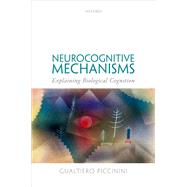
Neurocognitive Mechanisms Explaining Biological Cognition
by Piccinini, GualtieroBuy New
Rent Textbook
Rent Digital
Used Textbook
We're Sorry
Sold Out
How Marketplace Works:
- This item is offered by an independent seller and not shipped from our warehouse
- Item details like edition and cover design may differ from our description; see seller's comments before ordering.
- Sellers much confirm and ship within two business days; otherwise, the order will be cancelled and refunded.
- Marketplace purchases cannot be returned to eCampus.com. Contact the seller directly for inquiries; if no response within two days, contact customer service.
- Additional shipping costs apply to Marketplace purchases. Review shipping costs at checkout.
Summary
Piccinini argues that cognition is computational at least in a generic sense. He defends the computational theory of cognition from standard objections, yet also rebuts putative a priori arguments. He contends that the typical vehicles of neural computations are representations, and that, contrary to the received view, the representations posited by the computational theory of cognition are observable and manipulatable in the laboratory. He also contends that neural computations are neither digital nor analog; instead, neural computations are sui generis. He concludes by investigating the relation between computation and consciousness, suggesting that consciousness may be a functional phenomenon without being computational in nature. This book will be of interest to philosophers of cognitive science as well as neuroscientists.
Author Biography
Gualtiero Piccinini, University of Missouri - St. Louis
Gualtiero Piccinini is Curators' Distinguished Professor of Philosophy and Associate Director of the Center for Neurodynamics at the University of Missouri - St. Louis. In 2014, he received the Herbert A. Simon Award from the International Association for Computing and Philosophy. In 2018, he received the K. Jon Barwise Prize from the American Philosophical Association. In 2019, he received the Chancellor's Award for Research and Creativity from University of Missouri - St. Louis. His publications include Physical Computation: A Mechanistic Account (Oxford University Press, 2015).
An electronic version of this book is available through VitalSource.
This book is viewable on PC, Mac, iPhone, iPad, iPod Touch, and most smartphones.
By purchasing, you will be able to view this book online, as well as download it, for the chosen number of days.
Digital License
You are licensing a digital product for a set duration. Durations are set forth in the product description, with "Lifetime" typically meaning five (5) years of online access and permanent download to a supported device. All licenses are non-transferable.
More details can be found here.
A downloadable version of this book is available through the eCampus Reader or compatible Adobe readers.
Applications are available on iOS, Android, PC, Mac, and Windows Mobile platforms.
Please view the compatibility matrix prior to purchase.
